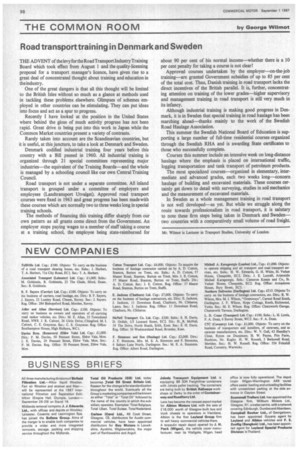RoadtransporttraininginDenmarkandSweden
Page 100

If you've noticed an error in this article please click here to report it so we can fix it.
THE ADVENT of the levy for the Road Transport Industry Training Board which took effect from August 1 and the quality-licensing proposal for a transport manager's licence, have given rise to a great deal of concentrated thought about training and education in the industry.
One of the great dangers is that all this thought will be limited to the British Isles without so much as a glance at methods used in tackling these problems elsewhere. Glimpses of schemes employed in other countries can be stimulating. They can put ideas into focus and act as a spur to progress.
Recently I have looked at the position in the United States where behind the gloss of much activity progress has not been rapid. Great drive is being put into this work in Japan while the Common Market countries present a variety of contrasts.
Rarely taken into account are the Scandinavian countries, but it is useful, at this juncture, to take a look at Denmark and Sweden.
Denmark codified industrial training four years before this country with a Bill passed in 1960. All industrial training is organized through 21 special committees representing major industries—the equivalent of the Training Boards—and the whole is managed by a schooling council like our own Central Training Council.
Road transport is not under a separate committee. All inland transport is grouped under a committee of employers and employees (Landtransport Utvalget). Approved road transport courses were fixed in 1963 and great progress has been made with these courses which are normally two to three weeks long in special training schools.
The methods of financing this training differ sharply from our own pattern as all grants come direct from the Government. An employer stops paying wages to a member of staff taking a course at a training school, the employee being state-reimbursed for about 90 per cent of his normal income—whether there is a 10 per cent penalty for taking a course is not clear!
Approved courses undertaken by the employer—on-the-job training—are granted Government subsidies of up to 85 per cent of the total cost. Thus, Danish training in road transport lacks the direct incentives of the British parallel. It is, further, concentrating attention on training of the lower grades—higher supervisory and management training in road transport is still very much in its infancy.
Although industrial training is making good progress in Denmark, it is in Sweden that special training in road haulage has been marching ahead—thanks mainly to the work of the Swedish Road Haulage Association.
This summer the Swedish National Board of Education is supporting a large number of full-time residential courses organized through the Swedish RHA and is awarding State certificates to those who successfully complete.
Courses this summer include an intensive week on long-distance haulage where the emphasis is placed on international traffic, logging transportation and tank transport of petroleum products.
The most specialized courses—organized in elementary, intermediate and advanced grades, each two weeks long—concern haulage of building and excavated materials. These courses certainly get down to detail with surveying, studies in soil mechanics and the measurement of excavated materials.
In Sweden as a whole management training in road transport is not well developed—as yet. But while we struggle along the route towards professionalism in road transport, it is salutary to note these firm steps being taken in Denmark and Sweden— two countries with a comparatively small volume of road freight.












































































































































